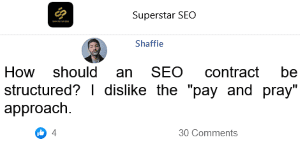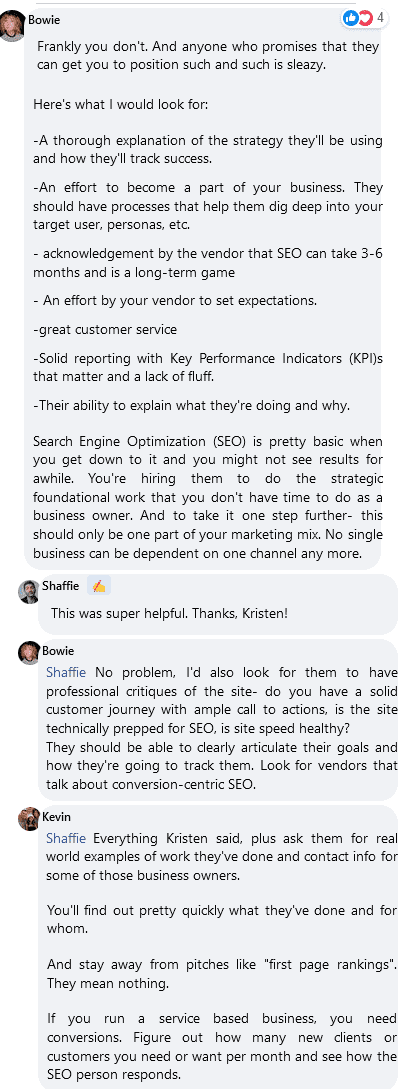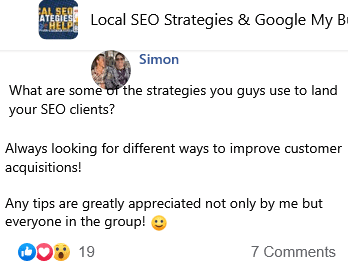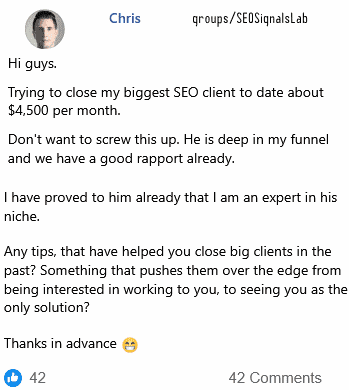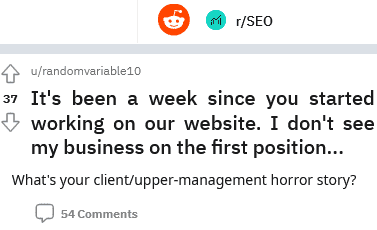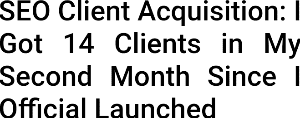How should an SEO contract be structured? I dislike the "pay and pray" approach.
4 👍🏽430 💬🗨
📰👈
Frankly you don't. And anyone who promises that they can get you to position such and such is sleazy.
Here's what I would look for:
-A thorough explanation of the strategy they'll be using and how they'll track success.
-An effort to become a part of your business. They should have processes that help them dig deep into your target user, personas, etc.
– acknowledgement by the vendor that SEO can take 3-6 months and is a long-term game
– An effort by your vendor to set expectations.
-great customer service
-Solid reporting with Key Performance Indicators (KPI)s that matter and a lack of fluff.
-Their ability to explain what they're doing and why.
Search Engine Optimization (SEO) is pretty basic when you get down to it and you might not see results for awhile. You're hiring them to do the strategic foundational work that you don't have time to do as a business owner. And to take it one step further- this should only be one part of your marketing mix. No single business can be dependent on one channel any more.
💟4
This was super helpful. Thanks, Kristen!
Bowie » Shaffie
No problem, I'd also look for them to have professional critiques of the site- do you have a solid customer journey with ample call to actions, is the site technically prepped for SEO, is site speed healthy?
They should be able to clearly articulate their goals and how they're going to track them. Look for vendors that talk about conversion-centric SEO
Kevin » Shaffie
Everything Kristen said, plus ask them for real world examples of work they've done and contact info for some of those business owners.
You'll find out pretty quickly what they've done and for whom.
And stay away from pitches like "first page rankings". They mean nothing.
If you run a service based business, you need conversions. Figure out how many new clients or customers you need or want per month and see how the SEO person responds.
📰👈
Truslow 🎩
A good contract will spell out certain goals and objectives. It won't guarantee that those will be achieved – but it will define them so the client knows what the team is trying to accomplish. It will also typically describe some of the ways that tracking the progress toward those goals will be accomplished. It's also good to have a strategy assessment plan outlined – where you might see something like "this strategy will be used for the first three months and then we'll begin assessing things monthly and adjust the strategy as needed to stay on track toward the outlined goals." In other words – if you're spending X hours a month on new content and it's not really paying off – maybe you want to take half those hours and put them on something else and see if that improves things.
Another thing to keep in mind is that things like "First Page Ranking for X Amount of Keywords" or "Y amount of monthly traffic" are worthless goals. A goal is an action that generates or has the potential to generate revenue – like sales, filling out a contact form, phone calls, other types of leads that can be followed up on, etc. Top ranking and traffic are just things you can use to see how you're progressing toward those goals. But if you aren't getting the sales and leads, then all the traffic and all the keyword ranking in the world is useless. It has to be the RIGHT keywords and the RIGHT traffic.
This is why there are so many negative "Pay and Pray" scenarios that often become reality. A client pays $2000 a month for top ranking of 20 keywords and 500+ visitors per day, but that doesn't actually generate much more than $1000 a month in leads or sales. The client is frustrated because they're spending more than they are making, but the SEO team can sit back and smile and say, "Yeah, but we delivered what we promised so it's your fault for not making money with it."
In the past year, we've had two clients where we didn't hit the goals we projected for them – but progress was occurring each and every month AND the generated revenue was greater than the cost by the end of the first six month term. The margins sucked and they weren't really making any money, but at least we weren't costing them anything. With some honest analysis of where we fell short, why we fell short, and what our plan was to remedy that, all three signed up with us again.
They signed up because the original contact defined success and defined how we would measure it in terms of value, not an arbitrary result that doesn't really mean anything. And, even though we felt bad for falling short on our projections, the client could easily see both progress and value to what we were doing. Sure, in a perfect world there would have been a bit more progress and a lot more value – but it was there and easy for them to see.
💟3
Ben Allen 🎓🎩
Unfortunately, just like any subjective field, it's mostly reputation and word of mouth. You could look up the #1 ranking businesses in competitive fields, but they may be niche-specific (some of the best ones are) and do particularly well in that niche because they know it and built relationships around it.
If you've found a few you like, look at their copy. Ask for references or recommendations. Any SEO agency, good or bad, is going to have people that quit 2 months in because they didn't see results, but any good SEO agency is going to have plenty of clients that rave about them, or stopped needing them/using them because they hit their KPIs and no longer needed their services (I disagree there, growth should always be scaled, but I digress).
If you go online and Google "best SEO agencies", you're just going to find the most expensive ones, many of whom paid the right people. Search Engine Optimization (SEO) is largely subjective, theoretical, and no two SEO users agree on what SEO is or should be. There's also no certification or policing for it. I don't even agree that they should necessarily be contract based, but if you get big enough to the point where you're tired of small, needy clients quit because they didn't see results in 2 weeks, I'd add contracts too. Then again, I'm pretty good at reading people and feeling out whether they'll be good clients.
In the past, when I had my own agency, if I didn't have the bandwidth, I'd refer people to the SEO users I knew were the best. They're all happy clients now.
So TL;DR: word of mouth. Ironic, for a digital marketing niche, I know, but it's the truth.
James
If I was in SEO I would sell service based on known facts. I would not sell crap either. I would offer monthly services alacart. My first service would be a S.W.O.T. of their website and the market. Then from there I would say recommend XYZ as a professional. I would let them know the time frame they will need. I would also let them know about their website quality and have somebody to outsource junky ones too. I would not work on websites that do not meet my standard based on moral, ethical, and quality issues. Then there will not be much of a contract outside of an ordering experience like you do on Legiit.com You would have your own website or services or at least a link that offers them the ability to pay for services that you suggest. If you are delivering true value people will stay with you. If you are just offering a way to get their money they will pay and bounce from you. Be in the business of being able to say no to people so you can build your work happiness.
Legiit.com – Get More Stuff Done
📰👈
Tips to Land High-Paying Clients in Digital Marketing on SEO Projects
Advice for SEO Beginners to get First Client
SEO Pricing a Month for a Client
Share your ways on How to Get SEO Clients?
How can you get the First SEO Marketing Client?
How to Determine Which Client Should get Marked as a Red Flag in SEO and Marketing?
How Long Does an SEO Need to Work to Claim itself an Expert?
Should I go for an MBA or Marketing Degree to be an SEO Expert?
